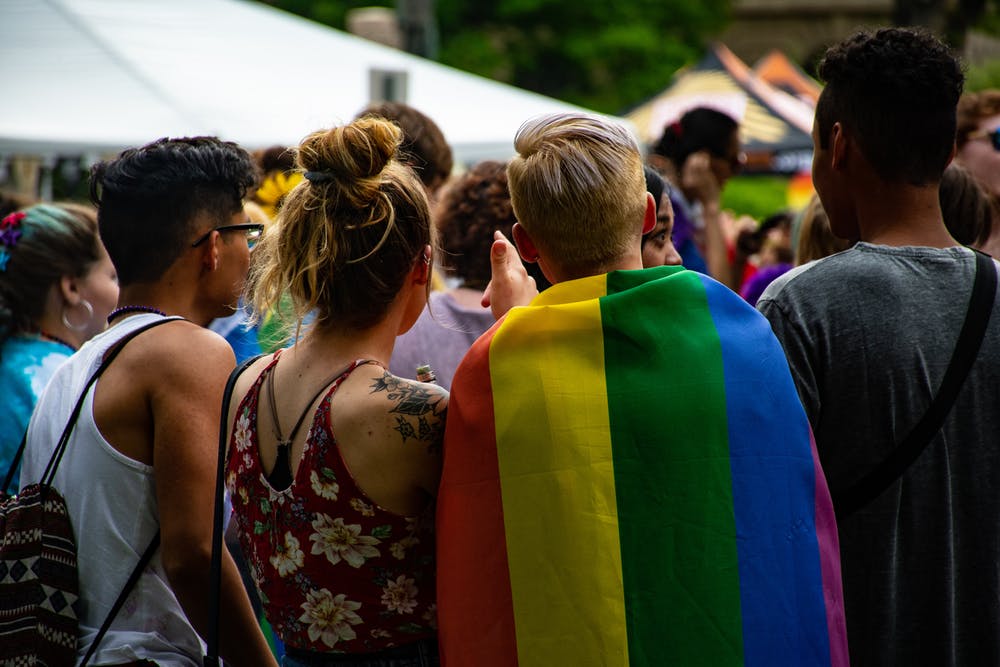In an age where acceptance and equality are more readily championed, we must still confront the prevailing mental health disparities experienced by distinct communities. Particularly, the gay community continues to face unique challenges. This blog aims to shed light on these specific mental health issues within the gay community. And fostering greater understanding and promoting conversations about gay and mental health that can lead to more empathetic mental health support.
Contents
Does Gender Affect Mental Health?
 Absolutely, gender does impact mental health in a variety of ways. The influence of gender on mental health is intertwined with societal roles, expectations, and stereotypes associated with different genders.
Absolutely, gender does impact mental health in a variety of ways. The influence of gender on mental health is intertwined with societal roles, expectations, and stereotypes associated with different genders.
Women, for example, have been found to experience higher rates of depression and anxiety disorders compared to men. This is possibly due to both biological factors (like hormonal fluctuations) and sociocultural factors such as gender-based discrimination, violence, and economic disadvantage. Women’s mental health is also affected by specific life stages, such as pregnancy and menopause.
On the other hand, men are statistically more likely to struggle with substance abuse and antisocial disorders. They are also more prone to suicide, despite women being more likely to experience depression. Gender also significantly impacts the mental health of transgender and non-binary individuals, who often face increased rates of mental health disorders due to societal stigma, discrimination, and the stress of gender dysphoria.
How Are Gay And Mental Health Connected?
The relationship between being gay and mental health is multi-faceted. And is often influenced by societal, personal, and environmental factors. The stigma, discrimination, and prejudice that many gay individuals experience can lead to a higher prevalence of mental health issues.
This is a phenomenon known as “minority stress.” Minority stress is stress that individuals from marginalized groups experience as a result of their minority status. And it can lead to significant mental and physical health issues.
Research shows that gay individuals are at a higher risk for mental health disorders. That includes depression, anxiety, and suicidal ideation and behaviors. The fear of coming out and the subsequent possible rejection, discrimination, or violence can lead to increased stress, anxiety, and feelings of isolation.
Additionally, some gay individuals may have difficulty accessing quality mental health care. This could be due to fear of stigma, lack of understanding or inclusivity from health professionals, or mental health services. That does not adequately address the unique experiences and needs of the gay community.
However, it’s essential to note that being gay in and of itself does not cause these mental health issues. The increased risk for mental health issues in the gay community is largely a response to external societal stressors and not an inherent aspect of being gay.
Common Mental Health Concerns Faced By Gay
 The mental health concerns faced by gay individuals are often shaped by a variety of factors including discrimination, stigma, and lack of social support. Here are some common mental health issues in the gay community:
The mental health concerns faced by gay individuals are often shaped by a variety of factors including discrimination, stigma, and lack of social support. Here are some common mental health issues in the gay community:
Depression
Gay individuals frequently face unique stresses and pressures that can significantly contribute to higher rates of depression. These can include rejection by family and friends, discrimination in social or work environments, and the internal struggle of accepting one’s sexual orientation. The constant pressure of these stressors can result in feelings of hopelessness and sadness, often leading to clinical depression.
Anxiety Disorders
Gay individuals may often live in a heightened state of anxiety due to a variety of factors. Fear of societal rejection, stress about coming out, or even daily microaggressions can result in chronic anxiety. This can manifest in various forms, such as generalized anxiety disorder, panic disorder, or social anxiety disorder.
Suicidal Thoughts and Behaviors
Due to the intense psychological stress and feelings of isolation, some gay individuals may experience suicidal thoughts or behaviors. The rate of suicide attempts is particularly high among young gay people, especially those who face family rejection, bullying, or homelessness as a result of their sexual orientation.
Substance Abuse
To cope with the psychological distress associated with discrimination and stigma, some gay individuals might turn to substances like drugs or alcohol. This can lead to higher rates of substance abuse disorders, which further exacerbate mental health issues and can have significant physical health impacts as well.
Post-Traumatic Stress Disorder (PTSD)
As a marginalized group, gay individuals are at an increased risk of experiencing traumatic events, such as physical or sexual violence, harassment, or extreme discrimination. The psychological impact of these events can lead to PTSD, characterized by flashbacks, nightmares, severe anxiety, and intrusive thoughts about the traumatic event.
Body Image Disorders and Eating Disorders
Within the gay community, particularly among men, there can be intense pressure to adhere to certain physical standards or ideals. This can lead to body dissatisfaction, over-exercising, and unhealthy eating behaviors. In some cases, these pressures can result in severe eating disorders like anorexia nervosa or bulimia nervosa.
Remember, while these issues are more common among gay individuals, they are not inevitable. Many gay individuals lead happy, healthy lives, and there is a range of support available. Moreover, societal change can significantly reduce these mental health disparities. The more understanding, acceptance, and support gay people receive from society, the less they will have to face these undue mental health challenges.
Strategies To Support Gay And Mental Health
 Supporting gay and mental health requires a multi-faceted approach that addresses individual needs, fosters supportive environments, and advocates for societal change. Here are some strategies:
Supporting gay and mental health requires a multi-faceted approach that addresses individual needs, fosters supportive environments, and advocates for societal change. Here are some strategies:
Accessible Mental Health Services
Promoting access to mental health services specifically tailored to the needs of the gay community can make a significant difference. This includes therapists and counselors who are trained in the unique challenges that gay individuals face.
Safe and Supportive Environments
Encouraging safe and accepting spaces where gay individuals can express themselves openly without fear of judgment or discrimination is crucial. This includes both physical spaces, like LGBTQ+ community centers, and virtual spaces like online forums and support groups.
Education and Awareness
Promote understanding and acceptance by educating the public about sexual orientation, the challenges faced by gay individuals, and the need to treat everyone with respect and dignity. This can help reduce stigma and discrimination.
Peer Support
Support from others who have similar experiences can be incredibly helpful. Peer support groups where gay individuals can share their experiences, struggles, and successes can be a source of comfort and strength.
Advocacy and Policy Changes
Advocate for laws and policies that protect the rights of gay individuals and promote equality. This includes anti-discrimination laws, hate crime laws, and inclusive school policies. Legal protections can help reduce systemic barriers and improve the mental health of gay individuals.
Family and Friend Support
Support from loved ones can make a significant difference to a gay individual’s mental health. Encourage families and friends to be open-minded, accepting, and supportive.
Self-Care
Encourage self-care practices that promote mental well-being. This can include mindfulness, exercise, a healthy diet, adequate sleep, and recreational activities. It’s also important to promote self-acceptance and self-love in the face of societal pressures.
Professional Help
If someone is struggling with mental health issues, it’s important to seek professional help. Psychologists, psychiatrists, and therapists can provide the necessary treatment, such as cognitive-behavioral therapy or medication.
These strategies together can help support the mental well-being of gay individuals and make society more inclusive and understanding. Remember, mental health is as important as physical health, and everyone deserves to live their life free from stigma and discrimination.
Conclusion
As we draw this exploration to a close, it’s important to reaffirm that being gay is just one of the many beautiful shades of human diversity. The mental health challenges faced by gay individuals are not inherent to their sexual orientation but are instead largely imposed by societal attitudes, stigma, and discrimination.
Through education, advocacy, and comprehensive mental health support, we can work towards a world where mental health disparities in the gay community are a thing of the past. We contribute to a richer, more empathetic society by embracing diversity. A place where everyone has the opportunity to live authentically and joyfully.
Life may sometimes be challenging if you are gay, but Online Gay Counseling can help. Get experienced LGBTQ therapists at PrideMantra: Book a trial LGBTQ therapy session


